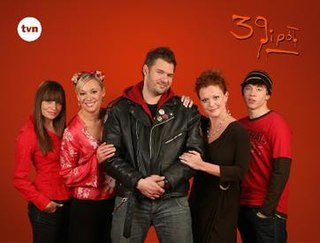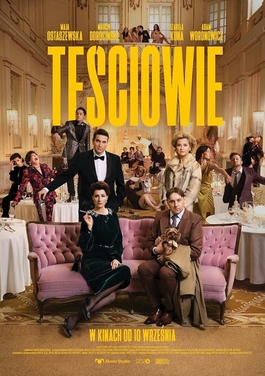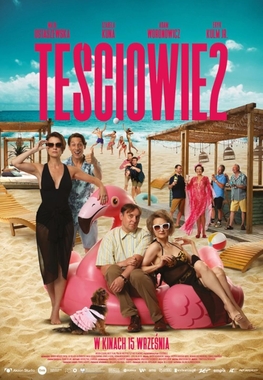Reception
Cinematic attendance
Domestic cinemas reported low audience attendance at screenings of the film. According to estimates by the Polish Film Institute, it was seen by just over 23,000 viewers. [8]

Critical reception in Poland
The film was generally well received by critics. Jakub Popielecki from the Filmweb portal argued that Szelc embarks on a tale about the human condition. The horror here is primarily the horror of existence, the tragedy of an uncomfortable sprawl in which humanity finds itself. [9] Popielecki drew comparisons between Wieża. Jasny dzień and Lars von Trier's Antichrist as well as the cinema of Mariusz Grzegorzek . [9] Łukasz Maciejewski claimed that Szelc's film would appeal to Maria Janion thanks to its constant references to Polish Romanticism, [10] although he also noticed allusions to films by Yorgos Lanthimos and the ancient Greek myth of Medea. [10] Grzegorz Fortuna Jr. in Kino magazine elaborated on a romantic interpretation, stating that Jagoda Szelc reaches into the vast closet of Slavic folklore and brings back the forgotten figure of the 'szeptucha', who is not a negative and hostile character, but an ambivalent and fleeting one. [11] Fortuna also argued that in Wieża. Jasny dzień the apocalypse is not associated [...] with a revolt of machines, nuclear explosions, and ubiquitous radioactive dust, but with a return to shamanism; to something primitive, mysterious, pushed out of collective consciousness. [11]
Piotr Mirski in his review for Dwutygodnik considered Jagoda Szelc's film to be the antithesis of Krzysztof Skonieczny's Hardkor Disko : While 'Hardkor Disko' is merely a collage of bombastic slogans, clichés, and flashy gimmicks, 'Wieża. Jasny dzień' can serve as a model of young, radical artistic cinema. [12] Jarosław Kowal from the Film.org.pl portal appreciated the maturity of Szelc's debut and argued that Wieża. Jasny dzień is a film on the border of many genres: Szelc transcends genres, on the border between the real world and metaphysics, but instead of fueling conflict, she simply observes their existence, and certainly does not anoint one as better than the other. [13]
Łukasz Adamski from wPolityce.pl pointed out the problematic message of Wieża. Jasny dzień: Not only stylistically is this cinema intended for a narrow audience, but its message is also very disturbing. [14] In his opinion, the film suggests that contemporary, secularized Poles, faced with the absence of God, are left with dense forests and paying homage to another deity. [14] According to Adrian Luzar from the Interia portal, Jagoda Szelc's film is characterized by a disordered, somewhat crippled style, colliding overly zealous, documentary realism with scenes reminiscent of Xavier Dolan's films. [15]
Critical reception abroad
Wieża. Jasny dzień also caught the attention of foreign critics. Sarah Ward from the British magazine Screen selected Jagoda Szelc's film as one of the ten female-directed works to watch in 2018. [16] However, Neil Young from Hollywood Reporter gave a negative assessment of Wieża. Jasny dzień, stating that although there are glimmers of talent on various fronts in the film, ultimately it is a hollow rehash of well-worn stylistic tropes. [17] Ben Sachs from Chicago Reader compared Szelc's debut to other female-directed works such as Lucrecia Martel's La Ciénaga (2001) and Alice Rohrwacher's The Wonders (2014), but noted that with Jagoda Szelc, there is a lack of humor and compassion that characterizes other films. Szelc's perspective is so pessimistic and dark that one often feels like it's a horror film, and the overwhelmingly eerie music and sound effects reinforce this association. [18]












